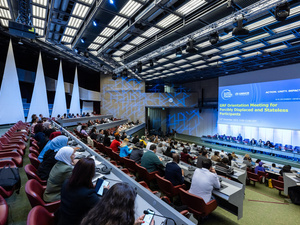UNHCR shines a beacon of hope on a devastated corner of Japan
UNHCR shines a beacon of hope on a devastated corner of Japan

Before the distribution, a local government official tests how effective a UNHCR solar lantern is.
TOKYO, Japan, April 1 (UNHCR) - When Shinji Kubo joined UNHCR 18 years ago, he dreamed of helping refugees around the world. "I never thought I would be back in my hometown, helping my neighbours," said the senior external relations officer for the UN refugee agency's Tokyo office.
That's just where he found himself earlier this week, handing out 1,800 special UNHCR solar lamps to benefit people from his native Ishinomaki in north-eastern Miyagi prefecture, one of the areas hardest hit by the March 11 earthquake and ensuing tsunami, which also triggered a devastating nuclear power plant accident.
UNHCR flew in the eco-friendly solar lamps from its supplier in India and trucked them to Ishinomaki to shine a ray of light - and hope - into the evacuation shelters for some 10,000 people.
Despite freezing temperatures and lack of water and electricity, resilient residents in the worst affected areas go back to clean up their damaged homes during the daytime but eat their meals and sleep in evacuation centres at night.
Kubo was astonished to find that in his previously tidy city, fish deposited far inland by the tsunami are now rotting, and most residents were wearing masks against the smell. Dust alternates with mud, depending on the weather, but residents are trying to keep active despite the unaccustomed hardship.
Local government officials and displaced residents at Minato Elementary School, temporary home to about 2,700 people, gratefully took delivery of the lamps on Wednesday. Charged by sunlight and normally bought by UNHCR for use in refugee camps, the lamps can run for hours at night.
Kubo, whose own family suffered in the earthquake and tsunami, said he hoped the beacons would be a comfort as well as a practical aid to people who had suffered so much so suddenly.
"They have lost their homes, their belongings and loved ones," he said. "Although the current situation is highly devastating, I hope this small light will help them face the reality and overcome difficulties in building up hope to rebuild a new life."
Hours after the earthquake and tsunami struck, UNHCR offered sympathy and practical help to Japan. Working with the Foreign Ministry, UNHCR has provided support to both UN efforts and Japan Platform - a coalition of non-governmental organizations (NGO), the business community and the government - in managing and collecting information on relief efforts by the NGO community.
"It is a time to demonstrate solidarity and provide support to the people of Japan," said Johan Cels, UNHCR's representative in Japan. "Japan has been a very strong supporter of refugees and UNHCR over so many years, so it is our duty now to assist wherever we can."
In the first hours after the earthquake - which also shook Tokyo - UNHCR staff went to great lengths to make sure that refugees in the country, who might not all understand Japanese, got information in foreign languages and knew which emergency phone numbers to call.
Now some groups of refugees are returning the favour by raising money for their new homeland in its hour of need.
By Yuki Moriya In Tokyo, Japan








